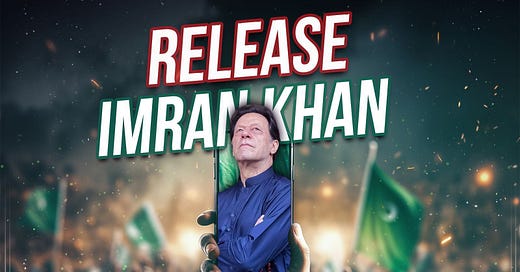Imran Khan Speaks from Jail
We cull out the essentials from his verified twitter handle post, that went online barely minutes ago.
Sensational Allegations Against General Asim Munir
In a gripping declaration from the depths of Adiala Jail, Imran Khan, the embattled former Prime Minister of Pakistan and the defiant supremo of the Pakistan Tehreek-e-Insaf (PTI), launched a scathing barrage of accusations against General Asim Munir, the Pakistan Army Chief. With the air charged with anticipation, Khan, surrounded by unnamed journalists in the somber setting, claimed that General Munir is the clandestine architect behind the scenes, manipulating state affairs and maliciously implicating him and his wife in the notorious Tosha Khana case. In a narrative replete with intrigue and allegations of a sinister conspiracy to silence his political dissent, Khan pointedly held General Munir as the mastermind responsible for any threats to his and his wife's safety, casting him as the central villain in a shadowy plot to usurp his political legacy.
General Asim Munir's Alleged Machinations
Khan accused General Munir of commandeering the state's reins, implicating him and his wife in the contentious Tosha Khana case in a calculated bid to crush his resolve. The specter of danger looming over him and his spouse was attributed directly to Munir's doorstep, painting a grim tableau of political vendettas and shadow warfare.
The London Plan: A Conspiracy Unveiled
With the theatrical flair of a seasoned politician, Khan spun the tale of the London Plan, a nefarious scheme allegedly concocted by General Munir and Nawaz Sharif. This plot, he claimed, saw the co-opting of judges, handpicked by the ISI, to lay the groundwork for his political demise, a chilling echo of machinations typically reserved for spy novels.
A Tangled Web of Accusations
The drama unfolded further with Khan recounting his arrest, where personal violations were compounded by the alleged seizure of his passport and chequebook, symbolizing his dramatic fall from power. He narrated a saga of forced witnesses and dubious legal proceedings aimed at securing his conviction in the Tosha Khana case, with promises of legal retribution against his perceived tormentors.
Political Manipulations and Assassination Fears
Khan laid bare a landscape rife with political intimidation, questionable detentions, and stark allegations of assassination plots, painting a dystopian picture of a democracy under siege. The tale took a darker turn with claims of an orchestrated attempt on his life, purportedly masked by the anonymity of plainclothes operatives, raising alarm over the sanctity of Pakistan's judicial establishments.
Historical Parallels and Dire Warnings
Drawing parallels with the tragic partition of East Pakistan, Khan warned of history repeating itself, with political mandates being usurped and the specter of economic disaster looming large. His narrative wove through the alleged financial misdemeanors of political dynasties, military overreach, and the personal toll of his political journey, culminating in a clarion call for judicial independence as the last bastion of hope for Pakistan.
A Defiant Stand Against Adversity
In the face of what he described as a concerted effort to erase his political legacy, Khan remained unyieldingly defiant, refusing to bow to what he perceives as the chains of subjugation. His discourse veered into the spiritual, invoking divine intervention as the ultimate arbiter of justice, in a land where human plans pale against the decrees of fate.
A Nation at a Crossroads
Imran Khan's explosive interview from the depths of Adiala Jail sends ripples across the political landscape, portraying a nation ensnared in a web of intrigue, its democratic soul in jeopardy. Amidst the swirling accusations and a plea for judicial salvation, the saga of Pakistan's fraught political theatre continues, with its next act yet unwritten.
Conclusion: A Cautious Optimism
Despite the challenging circumstances outlined by Imran Khan, there lies a cautious optimism for Pakistan, a nation at a crossroads. The resilience of its people and the potential for judicial integrity to foster economic and political stability offer a glimmer of hope for a country navigating through turbulent times. The situation calls for wisdom, unity, and a commitment to justice and democracy, holding the promise of a brighter future for Pakistan and its relations with its neighbours, including India.





